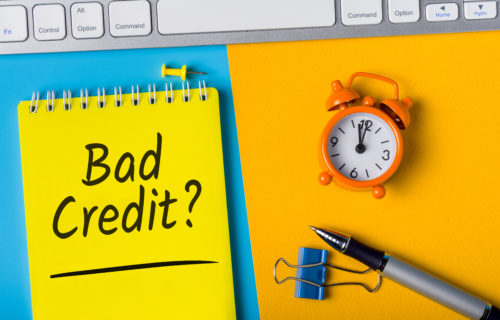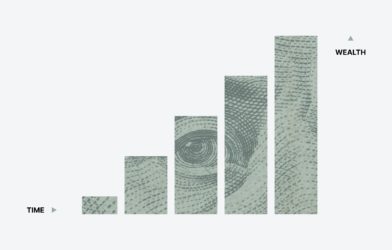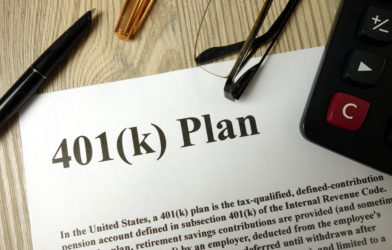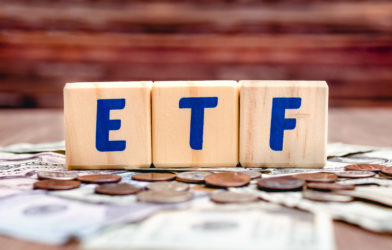If you have bad credit or a low credit score, you’re not alone. According to FICO, around 15.5 % of consumers have credit scores below 600. Getting a credit card, using it responsibly, and paying it off on time and in full is actually an excellent way to repair your credit. You may think that a prepaid or debit card is your only payment option, but secured credit cards are a good way to build better credit score.
There are credit cards that are designed specifically for people with bad credit. Plus, credit card issuers now make it easy to transition from secured credit cards to unsecured cards once the borrower builds a positive payment history.
If you’re looking for a way to rebuild your credit history and get on the road to good credit, read on to learn the top 5 credit cards for bad credit.
What does ‘bad credit’ mean?
Bad credit typically means credit scores lower than 580. You are considered a risky borrower if you have bad credit due to a large amount of debt or a history of defaulting on your loans or paying late.
There are three major credit bureaus that handle the details that make up your credit scores: Equifax, Experian, and TransUnion. These agencies look at your payment history and report your credit score in your credit report.
There are a few things to consider while looking for credit cards for bad credit.
- Annual fees
Credit cards designed for people with poor credit often come with annual fees. These can be anywhere from $35 to $99 or more. But there are also credit cards that don’t have annual fees, though they may have other requirements such as a security deposit.
- APRs
The annual percentage rate (APR) is the interest rate you’ll pay on any credit line you carry monthly. APRs on credit cards for people with bad credit are often higher than on other cards. That means if you don’t pay off your balance in full, you will be getting deeper in debt and potentially damaging your credit score further.
- Credit limit
A credit limit or credit line is the maximum amount of credit a financial institution extends to a client on a credit card. The credit limit for credit cards specifically for people with bad credit are usually lower than other cards.
- Rewards
Rewards programs are available on some credit cards for people with fair credit. These programs aren’t usually too generous, but they can still be valuable. Once you get a good credit score, you will be eligible for credit cards with better rewards.
Top 5 credit cards for bad credit
A bad credit score might discourage you and make you think you’re trapped with a subprime credit card. However, those with bad credit have many options, including the option to transition from a secured credit cards to unsecured credit cards after a history of on-time payments.
Here are five of the best credit cards for bad credit.
- Capital One Platinum Secured Credit Card
People with limited credit history can choose the Capital One Platinum secured credit card, as it doesn’t charge an annual fee and has a low APR on purchases and balance transfers. It also has a decent rewards program that lets you earn points on every purchase.
Benefits:
The Capital One Platinum secured card has a few perks, including access to your credit score and automatic credit line review for a higher credit line. You can also access your account 24/7 through Capital One’s mobile app.
Drawbacks:
This Capital One Platinum credit card has high interest rates. If you carry a monthly balance, you’ll pay a lot in interest, so make sure you use your platinum secured card responsibly. Also, it doesn’t offer any introductory APR periods of lower interest when you first sign up.
- Discover it Secured Credit Card
The Discover it Secured credit card is another good option for people with bad credit. It has no annual fee, and it offers a decent rewards program.
Plus, it has a 0% APR on purchases and balance transfers for the first 14 months. This can help you save money on interest if you plan on consolidating debt as well as building credit.
Benefits:
This credit card offers cash back on eligible purchases, a free FICO score check tool, and no penalty APRs. After eight months, the secured card also provides an automatic review to consider transitioning you to an unsecured card.
Drawbacks:
One drawback of the Discover it® Secured credit card is that it requires a minimum refundable security deposit starting at $200. This security deposit equals your credit limit, so if you want a credit limit of $500, you’ll need to deposit $500.
- Chime Credit Builder Visa Credit Card
One of the credit cards that can help you with rebuilding credit is the Chime Credit Builder Visa credit card. This credit card reports your payment history to all three credit bureaus, allowing you to build a positive credit history.
Benefits:
This card has no annual or hidden fees. It also immediately disables your card to avoid fraud if it is lost or stolen and offers free access to your FICO score through Experian.
Drawbacks:
One of the drawbacks of the Chime Credit Builder Visa credit card is its relatively low credit limit. Another downside is that it offers no rewards or introductory APR periods.
- Capital One Quicksilver Secured Cash Rewards Credit Card
The Capital One Quicksilver Secured Cash Rewards Credit Card is an excellent choice for people looking to rebuild credit and raise their poor credit scores.
As you earn 1.5% cash back and work toward getting a regular unsecured card, you will have the opportunity to improve your payment and credit history, which should have a positive impact on your credit report.
Benefits:
With a minimum refundable security deposit of $200, you may be able to qualify for the Capital One Quicksilver Secured Cash Rewards credit card. This credit card gives you access to credit monitoring and fraud protection.
Drawbacks:
The Capital One Quicksilver Secured Cash Rewards credit card has a relatively high APR. Another downside is that it doesn’t offer any introductory APR periods.
- OpenSky Secured Visa Credit Card
This secured credit card is issued without a credit check or a bank account. The OpenSky Secured Visa Credit Card can help you rebuild your credit reports, as it reports back to all three major credit bureaus.
Benefits:
This Visa credit card offers excellent benefits, including a lower APR, the ability to increase your credit limit, and free online access to your Experian credit score. You will have the chance to get an OpenSky Gold Unsecured Card after 12 months of on-time payments.
Drawbacks:
One of the drawbacks of the OpenSky Secured Visa Credit Card is that there is an annual fee of $35.
Frequently Asked Questions
Can I get a credit card with bad credit?
Yes, you can get a credit card with bad credit. Several options are available to you, and each has its benefits and drawbacks. You’ll need to decide which option is best for you based on your needs and financial goals.
Is a secured credit card my only option if I have bad credit?
This depends on your credit score. For people with very low credit scores, a secured credit card may be your only option. However, you can always try to apply for an unsecured credit card, especially once you’ve spent some time rebuilding your credit history.
What are the qualifications for a credit card for bad credit?
The qualifications vary from card to card. However, most specify the minimum credit score required and how much income you must make on a monthly basis.
What’s the easiest credit card to get approved for?
The OpenSky Secured Visa Credit Card is the easiest credit card to get approved for. It’s simple to qualify for this card because it doesn’t require a credit check or a bank account.
The Bottom Line
Several credit cards for bad credit are available to people who want to improve their credit. A secured credit card can be an excellent option to build your credit. An unsecured credit card may be a better option if you have a steady income and slightly higher credit score.
Unsecured cards often come with the perks of a higher credit limit, rewards opportunities, and lower APR. If you can’t qualify for an unsecured credit card right now, start using a secured credit card responsibly to boost your score and reinforce healthy financial habits.







